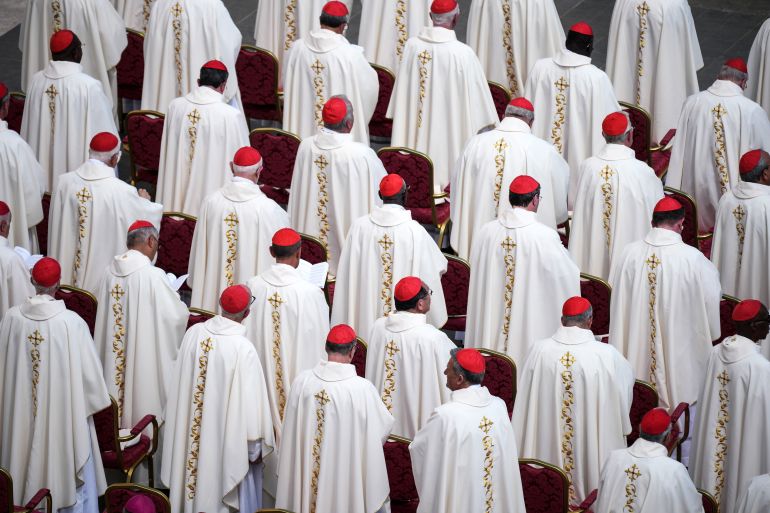Rome, Italy: When Pope Francis was elected in 2013, he was criticized for enlarging the Roman Catholic Church’s role for women.
He did, at least, deliver. Women were given access to important meetings by Francis, who also appointed the first woman to the Vatican governorate. These were significant accomplishments for a deeply conservative institution for some. However, Francis’s actions were insufficient to fulfill the requirements for a truly inclusive Church, according to many others.
The role of women in the Church continues to be a divisive issue as cardinals convene daily meetings before voting on his death on April 21. Will the cardinals have chosen a pope who can build on Francis’ changes, or someone who might reverse them, when they finally leave their cocoon in the Vatican?
Women’s Ordination Conference, a nonprofit organization dedicated to protecting women’s rights in Church institutions, is led by Kate McElwee, the executive director. Because there is a real desire for the [women’s] inclusion project to continue, there is some concern about whether the next papacy will experience some backsliding in the progress.
The project isn’t finished.
When it comes to women in the Church, Francis’ legacy is still up for debate.
At the Synod of Bishops, he gave women the authority to cast ballots on matters relating to the Church. Additionally, he appointed a dozen women to high-ranking positions, including Sister Simona Brambilla as the first female prefect of a Vatican office overseeing religious orders for both men and women, as well as Sister Raffaella Petrini as the head of the powerful Vatican City State and Barbara Jatta as the director of the Vatican Museums. Across Pope Francis’ papacy, according to Vatican figures, the percentage of women in the Church’s workforce increased from about 19% to 23.4% overall.
These were merely cosmetic changes, some people thought. The pope did not address the contentious subject of women ordination, particularly as priests and deacons.
The deacon’s position in the Catholic Church includes a few religious duties, including assisting with mass and assisting with baptism, but it does not permit the carrying out of the most sacraments.
By examining whether women could serve as deacons in the Church’s early years, Pope Francis established two commissions: the first in 2016 and the second in 2020. The commission could not reach an agreement on the subject, according to Francis, and the second group’s report never came to an end, while the third group’s work was never finished. Pope Francis vehemently opposed the ordination of women deacons in an interview with US broadcaster CBS in 2024. However, he approved the synod’s final document a few months later, saying the matter should remain an “open” question.
According to McElwee, “it seems like he unlocked the door but didn’t completely unlock it.”
And Pope John Paul II, who prohibited women from becoming priests in 1994, has since been repeatedly refuted.
Men’s All-Star Club
Members of an all-male body are currently debating the Church’s future. This underrepresentation is on full display in this context. Cardinals are addressing the main issues and priorities that a future pope should be able to address at pre-conclave meetings in Rome, including the Church’s sexual and financial scandals, the global crisis of faith, China’s relations, and the significance of canon law.
The majority of the cardinals who will cast ballots for the new pontiff inside the Sistine Chapel this week have been chosen by Pope Francis and support his goals in many ways, including climate change, migration, and social justice. However, some observers claim that they haven’t made a clear statement about the status of women in the Church.
The Stockholm, Sweden bishop, Cardinal Anders Arborelius, said it was “important to see that there are other ways” for women to serve the Church “than ordained ministry.” And Beniamino Stella, an Italian cardinal who is close to the late pope, surprised fellow clergymen by accusing Francis of opening the Vatican offices to non-clerical figures in a speech at a pre-conclave meeting this week.
Sister Marie, a nun waiting for the new pope’s election, greeted the Vatican from Marseille, France.
She said, “Everyone has their role, and we are happy to remain in our current position, which is not within the Church’s hierarchy,” when she asked for her surname to be kept secret. Women serving as deacons or priests “would denaturalize” the Church’s foundation and the transmission of the faith,” she said.
The conservative guard also criticized Francis’s choice to appoint nonclerical people to positions of authority. Leading conservative Cardinal Gerhard Ludwig Muller from Germany described the Roman Curia as an ecclesiastical body that should not be run by lay people in an interview with Repubblica last week. This was likely a criticism of Sister Brambilla’s appointment last year.

A reality that is already present
Sabina Pavone, a professor of history of Christianity at the University of Naples L’Orientale and a member of the Italian Society of Historians, claimed that the Church cannot afford to ignore the role and status of women.
“There is a realization that this topic needs to be addressed because it continues to be one of the hot topics,” Pavone said. “How to address it is not yet understood.
She noted that the inclusion of women in the Church is becoming increasingly important to the operation of Catholic institutions. Women are already taking the lead in many places around the world, from running parishes to providing local healthcare to teaching, while the majority of men are pursuing priesthood.
Source: Aljazeera

Leave a Reply